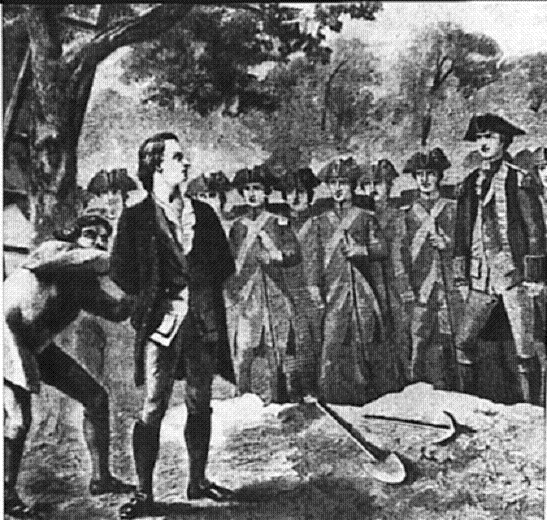A Spy in Tailor's Clothing - Hercules Mulligan
Updated 8/1/21
Hercules Mulligan was an American spy who used his tailor shop to obtain information from British Officers.
Hercules Mulligan
Many of Parliament’s tax increases just before the Revolutionary War hurt tailor businesses because they effected the fabric.
Hercules Mulligan was one of these tailors in New York City and he took part in many early demonstrations against tax collectors.
In 1773, a friend asked Hercules to take in a brilliant young student who was being sent from the Caribbean to study in America. This student was Alexander Hamilton.
Hamilton, who until his arrival supported the Mother Country, grew his revolutionary roots while living in the Mulligan Household.
Spy
After the British invaded New York City, Hercules stayed around to continue running his tailor shop.
Despite having protested Great Britain, Mulligan was not accused of treason. He continued his business, providing tailoring services for the British soldiers.
This was a mistake on their part, as he continued working for the Patriots in secret.
Hercules Mulligan became a spy.
Saving Washington
Mulligan’s time in espionage was extremely successful.
Among the information he collected were troop movements and battle strategies.
Most notably, Hercules discovered a plot by Thomas Hickey to assassinate General Washington. This information was quickly sent to the Continental Army and Washington’s location was changed, saving his life.
A few years later, after the British rushed an order of new uniforms through his shop, Mulligan learned they were planning a second attempt to capture Washington. This time the plan was a surprise raid through Connecticut.
Once again, Hercules’ information saved the Commander-in-Chief’s life.
Escaping Accusations
Mulligan was repeatedly questioned by the British authorities.
The most severe questioning was after Benedict Arnold’s treason. Arnold gave up Hercules as a spy, but somehow the fast talking Patriot was able to persuade his accusers that he’d done nothing wrong.
He did this by providing an alibi.
But how could he have had to been in two places at once to pass along the sensitive information?
Cato
Well, most of the information was passed by Cato, a person enslaved by the Mulligan Family.
Cato used his status as a slave to carry messages past the British with little question.
Before we jump on Hercules for having a servant do the work for him, bare in mind that, in later years, Mulligan was one of the founders of the New York Manumission Society which would successfully abolish slavery in the State in 1799.
Dinner with George
When the British evacuated New York City, and the Continental Army marched in, one of the first people George Washington dined with was Hercules Mulligan.
This was done to ensure that anyone who had seen him working closely with the British did not ‘take action into their own hands.’
It was a symbolic moment which let the people of that city known Mulligan was a Patriot, while simultaneously thanking him for his service.
That was the last time Mulligan would participate in the new government.
He returned to his tailor shop, only assisting in public life when he fulfilled a request by President Washington regarding a pair of pants he could not seem to find anywhere else.
Although there are several books about spies during the American Revolution which have been written lately, none give much attention to the work of Hercules Mulligan. Most of the focus is given (and rightfully so) to the work of the Culper Ring. The one (that I've read) which speaks the most about Mulligan is 'George Washington's Secret Spy War' which focuses mostly on Washington himself but includes stories about pretty much every spy under his command. Pick it up at the library or through our affiliate link below.
Also, if you have not signed up for our email list, now would be a great time to do so!






